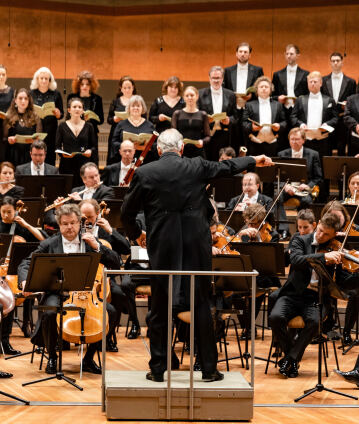John Eliot Gardiner conducts Brahms and Mendelssohn

John Eliot Gardiner and his Monteverdi Choir present two key choral works from the Romantic period. During this era, spiritual music was intended to edify. Johannes Brahms does that in his dramatic Schicksalslied by reinterpreting Hölderlin’s resigned text with an optimistic epilogue. Mendelssohn’s Second Symphony, on the other hand, shows the way from darkness into the radiant vision of a better world with melodious choruses, duets and arias.
After a Stravinsky programme in June 2016, Sir John Eliot Gardiner returns to the Berliner Philharmoniker with works of the German Romantic period. On this occasion, the orchestra will perform for the first time with the Monteverdi Choir, which was founded by the English conductor in 1964 and has long enjoyed worldwide fame.
In the introduction to a CD recording, Gardiner wrote of Johannes Brahms’s “wonderful and often underrated” choral music. This concert features his Schicksalslied, based on a poem from Hölderlin’s novel Hyperion and first performed in 1871. Brahms masterfully conveys through music the contrast that exists, according to the poet, between the serene, “fate-less” world of the ancient gods and human existence characterised by uncertainty and disorientation.
In Felix Mendelssohn’s Lobgesang, first performed in Leipzig in 1840, as in Beethoven’s Ninth, three instrumental movements are followed by an extended second part with vocal solos and chorus. But unlike Beethoven, Mendelssohn leaves the sphere of the secular, which is characteristic of the symphonic genre, and sets texts from various psalms to music in duets, arias, choruses and chorales in the second part. Instrumental themes from the first part are taken up again by the singing voices in the second part. Due to the break with traditional genres, Mendelssohn did not initially call his Lobgesang, composed for the 400th anniversary of the art of printing, a symphony, but a “symphonic cantata”.
Almost exactly twenty years after its last performance, which took place in March 2002 under the baton of Claudio Abbado, this wonderful work can be enjoyed again in a concert by the Philharmoniker.
© 2022 Berlin Phil Media GmbH
Related interview
Artists
Our recommendations
- Simon Rattle conducts Janáček’s “The Cunning Little Vixen”
- A Mozart evening with Daniel Harding
- Emmanuelle Haïm conducts Handel’s “Music for the Royal Fireworks”
- Andris Nelsons conducts Mahler’s Second Symphony
- John Eliot Gardiner conducts Stravinsky
- Daniel Barenboim plays Mozart’s Piano Concertos Nos. 20 to 27